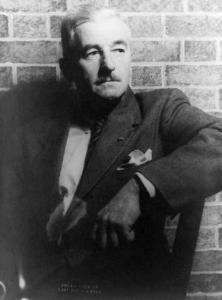The title of this blog post combines a bit of William Shakespeare with William Faulkner. I’m fairly confident neither William will sue me.
of this blog post combines a bit of William Shakespeare with William Faulkner. I’m fairly confident neither William will sue me.
Faulkner’s quote actually was, “In writing, you must kill all your darlings.” What did he mean by that? My interpretation is he meant for writers to look, as they edit their stories, for passages  with clever phrases, little jokes, or humorous anecdotes—the passages that made them smile as they wrote them for the first time. Then they are to ask themselves, “Does this passage relate to the story? Does it advance the plot? Does it help the reader understand the characters? Does the style or tone of the passage match the rest of the story?”
with clever phrases, little jokes, or humorous anecdotes—the passages that made them smile as they wrote them for the first time. Then they are to ask themselves, “Does this passage relate to the story? Does it advance the plot? Does it help the reader understand the characters? Does the style or tone of the passage match the rest of the story?”
Here’s the hard part. If the passage does not pass these tests, the writer must delete it. That’s difficult because the writer might consider the passage a demonstration of the greatest height of her talent. The writer may have fallen in love with a particular clause, a sentence, a paragraph, a character, a scene. However, for the sake of the story, the darling must go.
Here’s the even worse part. As he was writing, the author might have thought of and written the darling, fallen in love with it, and then bent the story around to force-fit the darling in. Now the question of killing the darling involves how much of a force-fit it was, and how much rewriting is necessary for the deletion. Even so, the writer should think hard about this, keeping in mind the story is more important than the darling.
Fortunately, the darling need not be so terminated that it vanishes to wherever deleted bits and bytes go. The writer can save it in a separate file, for potential use in a later story, one where it will fit better. Perhaps an entire story can be written around that darling. In the directories where I save my stories, there is almost always a “Deleted Sections” file I’ve created to dump the parts of early drafts that I’ve axed.
I don’t know that Faulkner was necessarily advocating more concise writing. After all, a writer could go back, kill the darlings, then replace them with even longer passages that fit the story better. I think he was advocating the writing of more integral stories, where each piece of the story is necessary and supports the plot and theme.
As you do this in your writing, don’t think of yourself as moving along the path to becoming a psychopathic murderer. Think of it as your effort to become a better self-editor, a writer who produces well-crafted stories. Though I may be known to my computer as the Killer of a Thousand Darlings, to you I’ll always remain—
Poseidon’s Scribe

You know you’re doing the right thing when it hurts to slice it out of the manuscript!
Hi, Kelly! So true, I’m afraid. Who knew writing would be so painful?